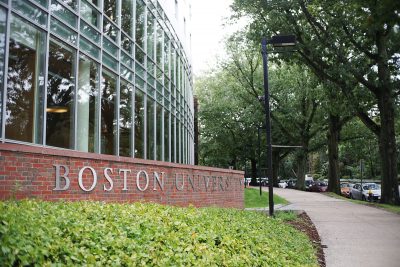
Off-campus Boston University students who test positive for COVID-19 may now stay in isolation housing on the Fenway campus free of charge. SOPHIE PARK/ DFP FILE
Boston University will now offer temporary isolation housing for students living off campus who test positive for COVID-19. The optional accommodations — located on the Fenway campus — were previously only available to students who lived in the University’s student housing.
BU spokesperson Colin Riley said these residences are provided free of charge for off-campus students to use throughout their recovery process. This decision comes in large part because COVID-19 case numbers on campus have been low and manageable, Riley said.
“A relatively stable number in isolation is sort of what allowed us to do this,” Riley said, “and the very good work being done to turn around those tests, identify those individuals, so we’re able to limit and contain the spread of the virus.”
Roughly 200,000 COVID-19 tests have been conducted on BU students, faculty and staff since late July, with around 140 positive tests total, according to BU’s COVID-19 Data Testing Dashboard.
Riley said the accommodations for off-campus students in university-provided isolation housing are comparable to typical dorms. As with all isolation housing, meals and beverages will be delivered to the student.
“The sanitary conditions are excellent,” Riley said. “It’s pretty stark. You’re walking into a place with a desk and a bed and a bathroom, and the whole purpose is to be able to get through without anyone else coming in contact with you.”
He added that students who live in these residences will have their symptoms monitored routinely and be in contact with the Dean of Students Office on a regular basis.
Students living off campus who test positive for COVID-19 and want to access isolation housing should call Residence Life or Healthway any day of the week, Riley said. Students can call Healthway at 617-353-0550 between 8 a.m. and 8 p.m.
Casey Smith, a sophomore in the Questrom School of Business who is currently living off campus, said she would opt for BU’s isolation housing if she tested positive for COVID-19.
“I wouldn’t want to stay in my apartment and risk infecting my roommates,” Smith said. “I think they’re doing it pretty safely, and their goal is to just get kids in and out of there as soon as they test negative again.”
College of Arts and Sciences junior Katherine Macneil, however, said she feels moving into on-campus isolation housing wouldn’t be necessary.
“I already was feeling okay about my plan,” Macneil said, “because I live off campus with three other roommates, and we have a pretty spacious apartment and I have my own room.”
Macneil said her plan for at-home isolation includes ensuring everyone in the apartment wears masks and having her friends drop food off to her. She said her roommates would stay in the apartment, too, because they would likely also contract the virus.
The main reason she wouldn’t likely be interested in taking up residence in BU housing, Macneil said, is that she prefers the amenities in her apartment. She added she was “surprised” the University began providing isolation housing for off-campus students a month into the semester, but that she supports the initiative.
Questrom senior lecturer Paul Hutchinson said he thinks offering isolation housing to off-campus students is an example of how the University is effective in helping students navigate the pandemic.
“One of the things that I am always most impressed with BU is that, especially for a big university, to be very student-centered,” Hutchinson said, “and really trying to think about how do we support and help our students when they’re in times of crisis.”



























































































































